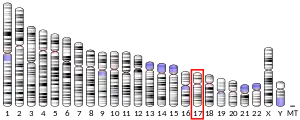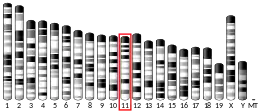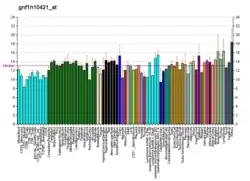| USH1G | |||||||||||||||||||||||||||||||||||||||||||||||||||
|---|---|---|---|---|---|---|---|---|---|---|---|---|---|---|---|---|---|---|---|---|---|---|---|---|---|---|---|---|---|---|---|---|---|---|---|---|---|---|---|---|---|---|---|---|---|---|---|---|---|---|---|
| |||||||||||||||||||||||||||||||||||||||||||||||||||
| Identifiers | |||||||||||||||||||||||||||||||||||||||||||||||||||
| Aliases | USH1G, ANKS4A, SANS, USH1 protein network component sans | ||||||||||||||||||||||||||||||||||||||||||||||||||
| External IDs | OMIM: 607696 MGI: 2450757 HomoloGene: 56113 GeneCards: USH1G | ||||||||||||||||||||||||||||||||||||||||||||||||||
| |||||||||||||||||||||||||||||||||||||||||||||||||||
| |||||||||||||||||||||||||||||||||||||||||||||||||||
| |||||||||||||||||||||||||||||||||||||||||||||||||||
| |||||||||||||||||||||||||||||||||||||||||||||||||||
| |||||||||||||||||||||||||||||||||||||||||||||||||||
| Wikidata | |||||||||||||||||||||||||||||||||||||||||||||||||||
| |||||||||||||||||||||||||||||||||||||||||||||||||||
Usher syndrome type-1G protein is a protein that in humans is encoded by the USH1G gene.[5][6]
This gene encodes a protein that contains three ankyrin domains, a class I PDZ-binding motif and a sterile alpha motif. The encoded protein interacts with harmonin, which is associated with Usher syndrome type 1C.
This protein plays a role in the development and maintenance of the auditory and visual systems and functions in the cohesion of hair bundles formed by inner ear sensory cells. Mutations in this gene are associated with Usher syndrome type 1G (USH1G).[6]
References
- 1 2 3 GRCh38: Ensembl release 89: ENSG00000182040 - Ensembl, May 2017
- 1 2 3 GRCm38: Ensembl release 89: ENSMUSG00000045288 - Ensembl, May 2017
- ↑ "Human PubMed Reference:". National Center for Biotechnology Information, U.S. National Library of Medicine.
- ↑ "Mouse PubMed Reference:". National Center for Biotechnology Information, U.S. National Library of Medicine.
- ↑ Weil D, El-Amraoui A, Masmoudi S, Mustapha M, Kikkawa Y, Laine S, Delmaghani S, Adato A, Nadifi S, Zina ZB, Hamel C, Gal A, Ayadi H, Yonekawa H, Petit C (Feb 2003). "Usher syndrome type I G (USH1G) is caused by mutations in the gene encoding SANS, a protein that associates with the USH1C protein, harmonin". Hum Mol Genet. 12 (5): 463–71. doi:10.1093/hmg/ddg051. PMID 12588794.
- 1 2 "Entrez Gene: USH1G Usher syndrome 1G (autosomal recessive)".
Further reading
- Ahmed ZM, Riazuddin S, Riazuddin S, Wilcox ER (2004). "The molecular genetics of Usher syndrome". Clin. Genet. 63 (6): 431–44. doi:10.1034/j.1399-0004.2003.00109.x. PMID 12786748. S2CID 21024265.
- Ahmed ZM, Riazuddin S, Bernstein SL, et al. (2001). "Mutations of the protocadherin gene PCDH15 cause Usher syndrome type 1F". Am. J. Hum. Genet. 69 (1): 25–34. doi:10.1086/321277. PMC 1226045. PMID 11398101.
- Mustapha M, Chouery E, Torchard-Pagnez D, et al. (2002). "A novel locus for Usher syndrome type I, USH1G, maps to chromosome 17q24-25". Hum. Genet. 110 (4): 348–50. doi:10.1007/s00439-002-0690-x. PMID 11941484. S2CID 26187816.
- Strausberg RL, Feingold EA, Grouse LH, et al. (2003). "Generation and initial analysis of more than 15,000 full-length human and mouse cDNA sequences". Proc. Natl. Acad. Sci. U.S.A. 99 (26): 16899–903. Bibcode:2002PNAS...9916899M. doi:10.1073/pnas.242603899. PMC 139241. PMID 12477932.
- Ota T, Suzuki Y, Nishikawa T, et al. (2004). "Complete sequencing and characterization of 21,243 full-length human cDNAs". Nat. Genet. 36 (1): 40–5. doi:10.1038/ng1285. PMID 14702039.
- Gerhard DS, Wagner L, Feingold EA, et al. (2004). "The status, quality, and expansion of the NIH full-length cDNA project: the Mammalian Gene Collection (MGC)". Genome Res. 14 (10B): 2121–7. doi:10.1101/gr.2596504. PMC 528928. PMID 15489334.
- Ouyang XM, Yan D, Du LL, et al. (2005). "Characterization of Usher syndrome type I gene mutations in an Usher syndrome patient population". Hum. Genet. 116 (4): 292–9. doi:10.1007/s00439-004-1227-2. PMID 15660226. S2CID 22812718.
- Kalay E, de Brouwer AP, Caylan R, et al. (2006). "A novel D458V mutation in the SANS PDZ binding motif causes atypical Usher syndrome". J. Mol. Med. 83 (12): 1025–32. doi:10.1007/s00109-005-0719-4. PMID 16283141. S2CID 41415771.
External links
This article is issued from Wikipedia. The text is licensed under Creative Commons - Attribution - Sharealike. Additional terms may apply for the media files.




